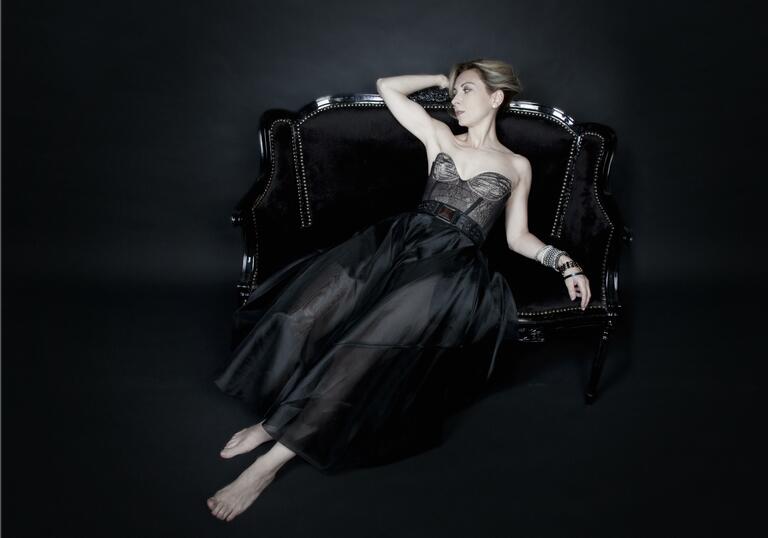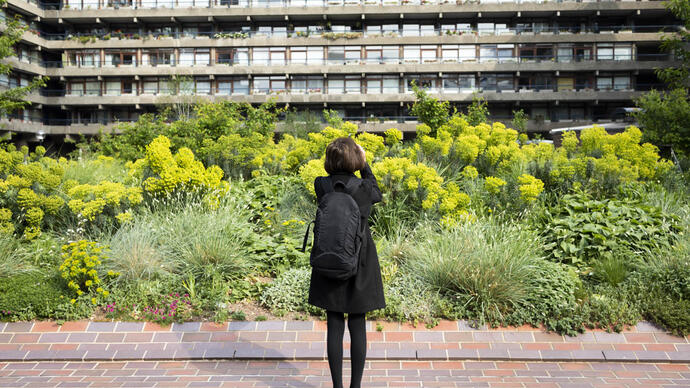
Programme and performers
Fanny Mendelssohn Dämmrung senkte sich von oben
Vorwurf
Suleika
Clara Schumann Liebst du um Schönheit
Sie liebten sich beide
Warum willst du and’re fragen
Er ist gekommen
Romance for piano in A minor, Op 21
Alma Mahler Bei dir ist es traut
Laue Sommernacht
In meines Vaters Garten
Ernest Chausson Chanson perpétuelle
Francis Poulenc La dame de Monte-Carlo
Claude Debussy ‘Mes longs cheveux’ from Pelléas et Mélisande
Jules Massenet Mélodie, Op 10 No 5
‘Pleurez mes yeux’ from Le Cid
Charles Gounod ‘Ah, je ris de me voir si belle’ from Faust
Natalie Dessay soprano
Philippe Cassard piano
Translations
Dämmrung senkte sich von oben
Dämmrung senkte sich von oben,
Schon ist alle Nähe fern,
Doch zuerst emporgehoben
Holden Lichts der Abendstern.
Alles schwankt ins Ungewisse,
Nebel schleichen in die Höh’,
Schwarzvertiefte Finsternisse
Widerspiegelnd ruht der See.
Nun am östlichen Bereiche
Ahn’ ich Mondenglanz und Glut,
Schlanker Weiden Haargezweige
Scherzen auf der nächsten Flut.
Durch bewegter Schatten Spiele
Zittert Lunas Zauberschein,
Und durchs Auge schleicht die Kühle
Sänftigend ins Herz hinein.
Johann Wolfgang von Goethe (1749–1832)
Vorwurf
Du klagst, dass bange Wehmut dich
beschleicht,
Weil sich der Wald entlaubt,
Und über deinem Haupt
Dahin der Wanderzug der Vögel streicht.
O klage nicht, bist selber wandelhaft,
Denkst du der Liebesglut?
Wie nun so traurig ruht in deiner Brust
Die müde Leidenschaft!
Nikolaus Lenau (1802–50)
Suleika
Ach, um deine feuchten Schwingen,
West, wie sehr ich dich beneide:
Denn du kannst ihm Kunde bringen
Was ich in der Trennung leide!
Die Bewegung deiner Flügel
Weckt im Busen stilles Sehnen;
Blumen, Augen, Wald und Hügel
Stehn bei deinem Hauch in Tränen.
Doch dein mildes sanftes Wehen
Kühlt die wunden Augenlider;
Ach, für Leid müsst’ ich vergehen,
Hofft’ ich nicht zu sehn ihn wieder.
Eile denn zu meinem Lieben,
Spreche sanft zu seinem Herzen;
Doch vermeid’ ihn zu betrüben
Und verbirg ihm meine Schmerzen.
Sag ihm, aber sag’s bescheiden:
Seine Liebe sei mein Leben,
Freudiges Gefühl von beiden
Wird mir seine Nähe geben.
Marianne von Willemer (1784–1860)
Dusk has descended from on high
Dusk has descended from on high,
All closeness has become distance now,
But risen first has
The Evening Star in beautiful radiance.
Everything reels into uncertainty,
Mists creep upwards;
Reflecting deep black darkness
The lake is at its rest.
Only in the eastern region
Do I sense the moon’s radiance and glow.
Hair-like branches of slender willows
Jest on the nearby water.
Amidst the play of moving shadows
Trembles Luna’s magic light,
And through the eye creeps coolness
Soothingly into the heart.
.
Reproach
You lament that fretful melancholy creeps
upon you,
As the woods lose their leaves,
And as above your head
Passes the train of migrating birds.
Do not lament! you too are fickle;
Do you recall love’s ardour?
How sadly now dwells
In your bosom passion exhausted!
.
Suleika
Ah, your moist wings,
I envy you, O west wind;
For you can bear him the message
Of how I suffer, parted from him!
The movement of your wings
Awakens in my bosom a quiet longing;
Flowers, eyes, woods and hills
Are damp with tears at your breath.
But your mild, gentle gusts
Cool the sore eyelids;
Ah, I should surely perish from grief,
Did I not hope to see him again.
Hurry then to my love,
Speak gently to his heart;
But do not sadden him
And hide my pain from him.
Tell him, but tell him modestly,
That his love is my life,
Joyful feeling of both
His closeness will give me.
Translations by Bettina Reinke-Welsh © Hyperion Records
Mélisande
Mes longs cheveux descendent
jusqu’au seuil de la tour;
Mes cheveux vous attendent
tout le long de la tour,
Et tout le long du jour,
Et tout le long du jour.
Saint Daniel et Saint Michel,
Saint Michel et Saint Raphaël,
Je suis née un dimanche,
Un dimanche à midi …
Maurice Maeterlinck (1862–1949)
Mélisande
My long hair falls
to the foot of the tower;
my hair awaits you
the length of the tower
and all through the day,
and all day long.
Saint Daniel and Saint Michael,
Saint Michael and Saint Raphael,
I was born on a Sunday,
A Sunday at noon …
Translation © Erato/Warner Classics
Artist biographies
Since the beginning of her career, Natalie Dessay has appeared on leading international stages, performing roles by Mozart (Blondchen, Queen of the Night and Pamina) and Richard Strauss (Fiakermilli, Zerbinetta and Sophie). During her career she has been a regular visitor to the Vienna State Opera, Metropolitan Opera, New York, La Scala, Milan, Barcelona’s Liceu, Royal Opera House, Covent Garden, and Paris National Opera.
She is also fêted for her interpretation of French operatic repertoire,including such roles as Ophélie, Minka, Lakmé, Olympia, Juliette and Manon. She has also enjoyed great success in the bel canto repertoire, in La sonnambula and particularly in the titlerole of Lucia di Lammermoor, which she has sung at the Chicago Opera, Metropolitan Opera, Paris National Opera, and has recorded under Valery Gergiev’s baton.
Other highlights include Marie (La fille du régiment), directed by Laurent Pelly, at Covent Garden, the Vienna State Opera, Metropolitan Opera and Paris National Opera; Violetta (La traviata) in Tokyo, at the Aix-en-Provence Festival, Vienna State Opera and Metropolitan Opera; the title-role in Manon at the Théâtre du Capitole in Toulouse; and Handel roles with conductor Emmanuelle Haïm.
She also collaborates with Michel Legrand, with whom she has toured in Europe and South America and recorded two CDs. Philippe Cassard is her pianist for recitals: together they have given around 60 concerts on the most prestigious stages, including Carnegie Hall in New York, Jordan Hall in Boston, here at the Barbican, Suntory Hall in Tokyo, Vienna Musikverein, Tchaikovsky Hall in Moscow and Théâtre des Champs-Élysées in Paris; next year they give a recital at the Wiener Staatsoper. They have released three albums together.
Natalie Dessay has been appointed a Kammersängerin by the Wiener Staatsoper.
She made an acclaimed theatrical debut in Howard Baker’s monologue Und at the Théâtre Olympia in Tours, subsequently performing it in many French cities as well as Théâtre des Abbesses and Dejazet in Paris. She has also performed Stefan Zweig’s La Légende d’une vie at the Théâtre Montparnasse.

Our Patrons and supporters
Find out about our Patrons, who help us keep our programme accessible to everyone and allow us to continue investing in the artists and communities we work with.
Love the arts? Become a Patron to engage more closely with our programme.

Who we are
Meet our management team, our Board and the Trustees of our charitable arm, Barbican Centre Trust.
